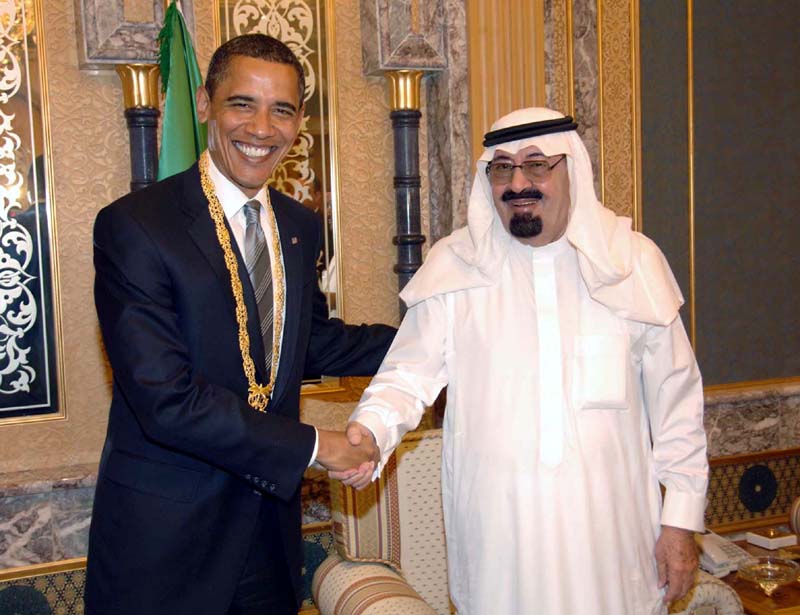
A new report from the Center for a New American Security says that “the conventional wisdom” about how a nuclear Iran would spark a dangerous nuclear arms race in the Middle East “is probably wrong.”
“It is widely assumed that Saudi Arabia would respond to Iran’s acquisition of nuclear weapons by embarking on a crash program to develop their own bomb or by illicitly receiving nuclear weapons from its close ally Pakistan,” write Melissa G. Dalton, Matthew Irvine, and Colin Kahl, a Georgetown professor and former Obama administration official.
“These scenarios have been repeated so often in Washington and elsewhere that they have assumed a taken-for-granted quality,” they add.
Yet none of these outcomes represent the most likely Saudi response to a nuclear-armed Iran. The Saudis would be highly motivated to acquire some form of nuclear deterrent to counter an Iranian bomb. However, significant disincentives – including the prospect of worsening Saudi Arabia’s security environment, rupturing strategic ties with the United States, damaging the country’s international reputation and making the Kingdom the target of sanctions – would discourage a mad rush by Riyadh to develop nuclear weapons. And, in any case, Saudi Arabia lacks the technological and bureaucratic wherewithal to do so any time in the foreseeable future. Saudi Arabia is more likely to respond to Iranian nuclearization by continuing to bolster its conventional defenses against Iranian aggression while engaging in a long-term hedging strategy designed to improve civilian nuclear capabilities.
The report goes into much more depth about how unlikely it is that Saudi Arabia, or anyone else, would respond to a nuclear-armed Iran by started their own nuclear weapons program.
It’s important to note here, again, that it is still the consensus opinion in the US and Israeli intelligence communities that Iran is not currently pursuing a nuclear weapon, despite what politicians irresponsibly spew. So the scenario of a nuclear-armed Iran is entirely hypothetical.
However, it is an important hypothetical, because one of the few scare-stories Washington is able to conjure up about some fictional future nuclear Iran is this arms race script. This scare-story is currently being employed to justify military build-ups in the Middle East, subservience to Israel’s supposed security interests, and cruel collective punishment on the Iranian people in the form of harsh economic sanctions.
These CNAS wonks aren’t the first to debunk the arms race scenario, though. Renowned international relations theorist Kenneth Waltz wrote in Foreign Affairs this past summer that this “oft-touted worry” is “unfounded.”
Properly defined, the term “proliferation” means a rapid and uncontrolled spread. Nothing like that has occurred; in fact, since 1970, there has been a marked slowdown in the emergence of nuclear states. There is no reason to expect that this pattern will change now. Should Iran become the second Middle Eastern nuclear power since 1945, it would hardly signal the start of a landslide. When Israel acquired the bomb in the 1960s, it was at war with many of its neighbors. Its nuclear arms were a much bigger threat to the Arab world than Iran’s program is today. If an atomic Israel did not trigger an arms race then, there is no reason a nuclear Iran should now.
It’s much easier for people to concede that Saudi Arabia would not go for the bomb in response to a nuclear Iran, I think. Washington wonks can list the multitude of disincentives Saudi Arabia would face to developing nukes, but nearly everyone buys into the rhetoric about an Iran determined to get them.
Why? It’s not as if a nuclear Saudi Arabia is any less scary than a nuclear Iran. Hawks, like Israel’s Bibi Netanyahu, engender fear about a nuclear Iran by claiming they are a suicidal nation for which “mutually assured destruction is not a deterrent.” The evidence for this is Iran’s supposed support for Hezbollah and Hamas, but Saudi Arabia has a long history of supporting radical Sunni jihadists with habits of suicide bombings (think mujahideen). Indeed, they’re doing so right now in Syria – in contravention of a US decision to officially designate the leading Syrian rebel group, Jabhat al-Nusra, a terrorist group. Shiite Iran, with its competitive political elections and vibrant social sphere, is far less extremist than the authoritarian Saudi version of Wahabism.
But no. Saudi Arabia is Washington’s ally, so it’s harder to evoke credible scare-stories about their speculative drive to get the bomb. Iran, on the other hand, is an official enemy. Scare-stories about official enemies – no matter how outlandish – are at the ready.




"And, in any case, Saudi Arabia lacks the technological and bureaucratic wherewithal to do so any time in the foreseeable future."
Indeed.
First thing is first.
Shall we start with a light bulb and I mean collectively too.
Faramarz Fathi
What an interesting topic. I'm really excited about the talent of the author. It's incredible interesting post.